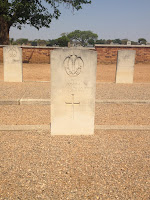Rhodesia's Forgotten Soldiers

It is a hot, dusty day in early November. Splashes of red, orange and pink bougainvillea line the road, like fireworks frozen against the vast blue sky. Lady Stanley cemetery sprawls itself out as far as the eye can see: order has given way to expediency and every available space is taken. Wreaths of fake flowers in garish colours spell out names; shiny foil ribbons flicker in the sunlight or wave limply in a stray wind. A minibus emblazoned with the words ‘Exodus Funeral Services’ bounces manically down a narrow road separating the Muslim part of the cemetery from the rest and, in the distance, a blue and white striped gazebo marks a current internment. The war graves are relatively easy to find, being enclosed by a low wall and demarcated by neat white lines of headstones, standing straight and tall. The heat beats down on me as I read the inscriptions: Labourer, Cepha...


